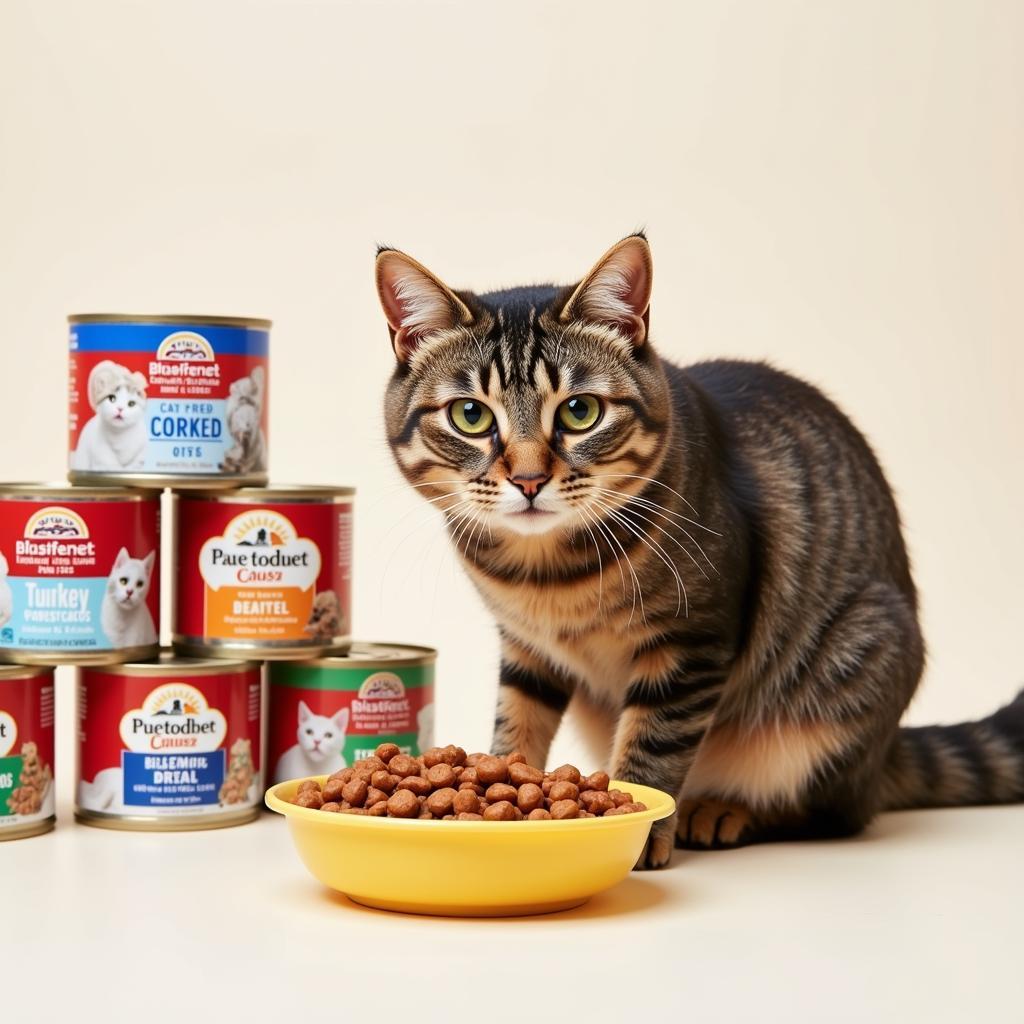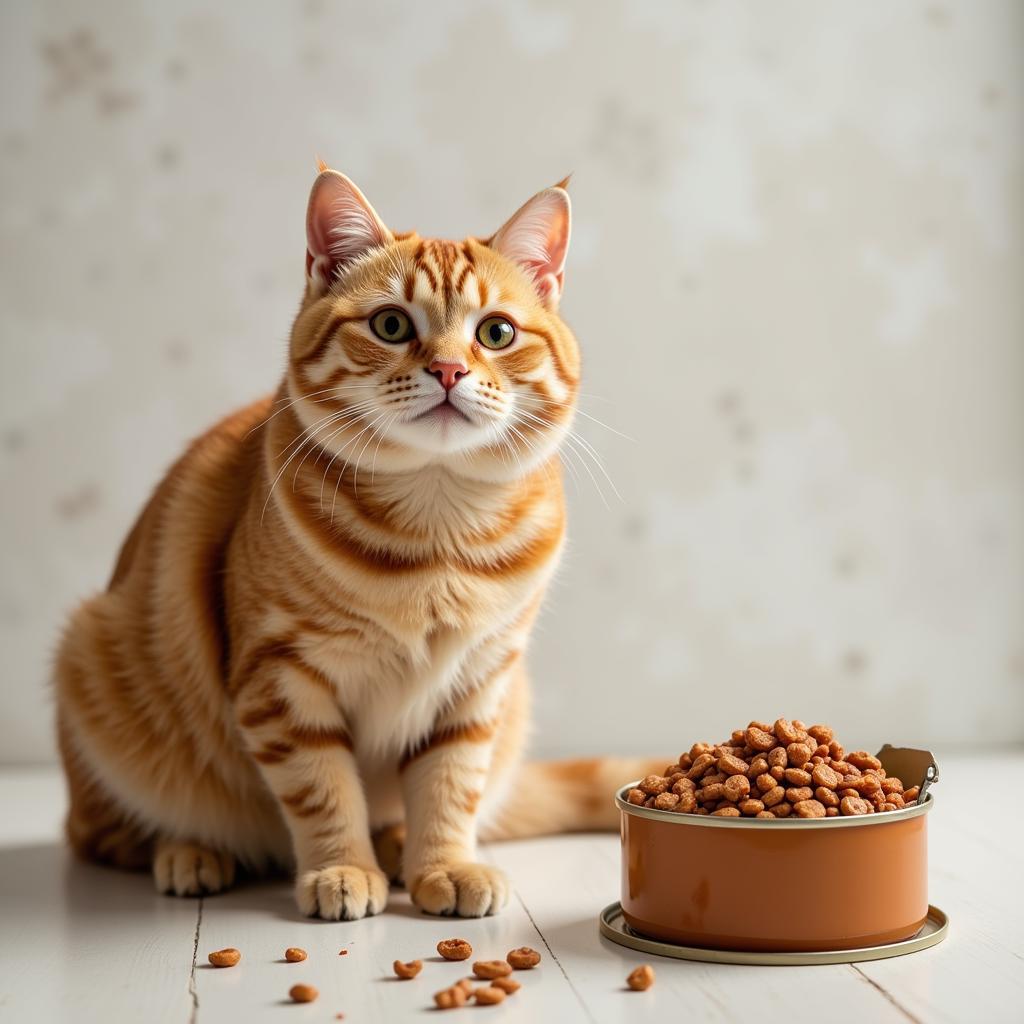Turkey Canned Cat Food offers a palatable and convenient way to provide your feline friend with a nutritious meal. But with so many options available, choosing the right one can be overwhelming. This guide will explore the benefits, considerations, and everything you need to know about selecting the perfect turkey canned cat food for your purrfect companion.  Benefits of Turkey Canned Cat Food for Cats
Benefits of Turkey Canned Cat Food for Cats
Why Choose Turkey Canned Cat Food?
Turkey is a lean protein source that’s packed with essential amino acids, vital for muscle development and overall health. It’s also a good source of taurine, an amino acid crucial for feline heart and eye health. Canned food, in general, has a higher moisture content compared to dry kibble, which can be beneficial for cats who don’t drink enough water, helping to prevent urinary tract issues. This is especially important for older cats or those prone to dehydration. Furthermore, turkey is often a novel protein source, meaning it’s less likely to trigger allergies in cats sensitive to more common proteins like chicken or beef.
What are some specific benefits of choosing canned cat food turkey for your cat? Well, it’s highly digestible, making it a good choice for cats with sensitive stomachs. Plus, the appealing aroma and texture of canned food often entice picky eaters, ensuring they get the nutrients they need.
Decoding the Label: What to Look For in Turkey Canned Cat Food
Not all turkey canned cat foods are created equal. Understanding how to read and interpret the label is crucial for making an informed decision. Look for a product that lists turkey as the primary ingredient. Avoid foods with fillers like corn, wheat, or soy, which offer little nutritional value. Check for the AAFCO statement, ensuring the food meets the nutritional requirements for cats.
Is Canned Turkey a Good Source of Protein for My Cat?
Yes! Turkey provides high-quality protein essential for your cat’s growth, muscle maintenance, and overall well-being. Protein is the cornerstone of a cat’s diet, providing the building blocks for a healthy body. Choosing a turkey canned cat food ensures your cat receives a palatable and easily digestible source of this vital nutrient.
How Much Turkey Canned Cat Food Should I Feed My Cat?
Feeding guidelines vary depending on the cat’s age, weight, activity level, and the specific brand of food. Always refer to the feeding instructions on the can for guidance. It’s also important to consult with your veterinarian to determine the appropriate portion size for your individual cat’s needs. They can offer personalized recommendations based on your cat’s health and lifestyle.
Addressing Common Concerns: Debunking Myths About Turkey Canned Cat Food
Some pet owners worry about canned food causing dental issues. While this can be a concern with any type of food, ensuring your cat has access to fresh water and offering dental treats can help mitigate this risk. canned dog food turkey is also a great option. Remember, regular veterinary check-ups are essential for maintaining your cat’s overall health, including dental hygiene. Another misconception is that canned food is more expensive than dry food. While the initial cost per can might seem higher, remember that canned food is more nutrient-dense, meaning you may need to feed less of it compared to dry kibble, potentially balancing out the cost over time. You can also find [rachael ray dog food turkey and potato](https://minacones.com/rachael ray-dog-food-turkey-and-potato/) if you have a dog too.
Transitioning to Turkey Canned Cat Food
If you’re switching your cat from dry food to canned food, it’s important to do it gradually. Start by mixing a small amount of canned food with the dry food, gradually increasing the proportion of canned food over several days. This allows your cat’s digestive system to adjust to the new food. Don’t forget that even if your cat loves the new turkey and pumpkin dog food, a gradual transition is still best.
Conclusion: Making the Right Choice for Your Feline Friend
Choosing the best turkey canned cat food involves careful consideration of your cat’s individual needs, preferences, and health conditions. By understanding label information, considering the benefits of canned food, and addressing common concerns, you can make an informed decision that supports your cat’s long-term health and well-being.  A happy cat sitting next to a can of turkey canned cat food Remember that canned heat for food isn’t relevant to pet food.
A happy cat sitting next to a can of turkey canned cat food Remember that canned heat for food isn’t relevant to pet food.
FAQ
- Is turkey canned cat food good for senior cats? Yes, the higher moisture content can benefit senior cats who may not drink enough water.
- Can kittens eat turkey canned cat food? Kitten formulas are generally recommended, but consult your vet.
- What if my cat doesn’t like turkey canned cat food? Try different brands or flavors.
- How should I store opened canned cat food? Refrigerate and use within a few days.
- Is it okay to mix dry and canned food? Yes, but monitor your cat’s overall calorie intake.
- Can turkey canned cat food help with hairballs? Not specifically, but a balanced diet contributes to overall health.
- My cat is allergic to chicken, will they be allergic to turkey? While less common, allergies can occur. Introduce slowly and monitor for reactions.
Need more help choosing the right food? Read our guide on canned cat food turkey.
Contact us for 24/7 support: Phone: 02437655121, Email: [email protected] or visit us at 3PGH+8R9, ĐT70A, thôn Trung, Bắc Từ Liêm, Hà Nội, Việt Nam.